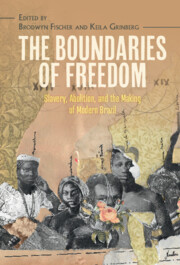Book contents
- The Boundaries of Freedom
- Afro-Latin America
- The Boundaries of Freedom
- Copyright page
- Contents
- Figures
- Tables
- Acknowledgments
- Introduction Slavery and Freedom in Nineteenth-Century Brazil
- Part I Law, Precarity, and Affective Economies during Brazil’s Slave Empire
- Part II Bounded Emancipations
- Part III Racial Silence and Black Intellectual Subjectivities
- 9 Breaking the Silence
- 10 The Life and Times of a Free Black Man in Brazil’s Era of Abolition
- 11 Political Dissonance in the Name of Freedom
- 12 “The East River Reminds Me of the Paraná”
- Part IV Afterlives of Slavery, Afterwards of Abolition
- Bibliography
- Index
11 - Political Dissonance in the Name of Freedom
Brazil’s Black Organizations in the Age of Abolition
from Part III - Racial Silence and Black Intellectual Subjectivities
- The Boundaries of Freedom
- Afro-Latin America
- The Boundaries of Freedom
- Copyright page
- Contents
- Figures
- Tables
- Acknowledgments
- Introduction Slavery and Freedom in Nineteenth-Century Brazil
- Part I Law, Precarity, and Affective Economies during Brazil’s Slave Empire
- Part II Bounded Emancipations
- Part III Racial Silence and Black Intellectual Subjectivities
- 9 Breaking the Silence
- 10 The Life and Times of a Free Black Man in Brazil’s Era of Abolition
- 11 Political Dissonance in the Name of Freedom
- 12 “The East River Reminds Me of the Paraná”
- Part IV Afterlives of Slavery, Afterwards of Abolition
- Bibliography
- Index
Summary
Based on an analysis of Black political associations in the nineteenth century, this chapter invite a more attentive observation about the possibilities for action available to free and freed Black people at that time, as well as a re-examination of conceptual categorizations that can be used to legitimize problematic discourses involving the Brazilian racial experience. Along those lines, this article is a counterpoint to established generalizations with regard to the participation of Black and poor populations in the political scene during the last decades of the nineteenth century. Such interpretations have exercised much influence over the ways in which multiple generations of historians have interpreted the trajectories of free Afro-descendants. On the basis of information uncovered about a group of Black organizations that were active in the immediate post-abolition period in Rio de Janeiro and São Paulo, this article aims to analyze the articulations among various efforts organized by the Afro-descendants in defense of their citizenship and status as free people.
Information
- Type
- Chapter
- Information
- The Boundaries of FreedomSlavery, Abolition, and the Making of Modern Brazil, pp. 287 - 314Publisher: Cambridge University PressPrint publication year: 2022
